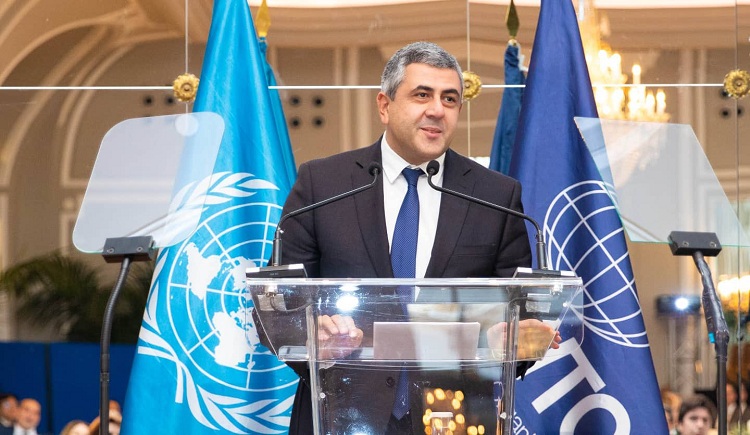Alberto Rubio
Three weeks before the General Assembly of the World Tourism Organization, which will begin in Madrid on November 30, Zurab Pololikashvili yesterday called on the 159 member countries to collaborate in “formalizing harmonized and globally accepted protocols for the free movement of tourists”. The objective: to definitively overcome the harsh impact of the pandemic on the tourism sector.
The UNWTO leader affirmed, during an event held at the Ritz Hotel in Madrid, that “we cannot afford to stand still” and recalled the active participation of this organization in the Future of Tourism World Summit, held in Barcelona; the World Travel Market in London and COP26 in Glasgow. “Next week,” he added, “I will also participate in the EU Ministers’ Summit, which is a main driver towards the reopening of tourism.”
Before a hundred ambassadors and diplomats, Pololikashvili broke down the figures left by the pandemic on tourism: 1 billion fewer travelers than in 2019; losses of $2 trillion, 70% of the world total; 100 million jobs lost; hundreds of thousands of businesses ruined.
Faced with this panorama, the UNWTO secretary general pointed out that this organization “knew how to adapt” in the face of a crisis that “has demonstrated the relevance of tourism for society and the economy.” In this regard, he reviewed the work carried out by the UNWTO since the beginning of the pandemic with different organizations such as the UN International Civil Aviation Organization (ICAO); the FAO; and the European Bank for Reconstruction and Development (EBRD).
With ICAO, “we are working to restore confidence in air travel,” said Pololikashvili, with FAO, “so that tourism can drive sustainable development in rural areas,” and with the EBRD, “we are providing support through our technical assistance package for tourism recovery.
The secretary general stressed that he has fulfilled his 2019 commitment for the 2020-2021 work program by “designing and catalyzing a Multilateral Tourism Trust Fund with the World Bank.” In addition, media campaigns were launched on CNN, Euronews and Xinhua news agency while UNWTO increased its “digital footprint” to support member countries “through partnerships with Google, Instagram and Facebook.”
In education and training, in addition to the launch of the Students League, the Organization’s work focused on expanding the professional skills of young people with initiatives such as the Online Academy, in partnership with IE University, and a dozen courses taught at universities such as those of Glion, Ecole D’ucasse, or Les Roches.
As for entrepreneurs, the UNWTO organized 17 innovation competitions, in which more than 10,000 projects from 150 countries were registered and thanks to which the winning start-ups obtained more than US$74 million for their initiatives.
Added to all this was the creation of the UNWTO Global Crisis Committee; the empowerment of the Tourism Barometer; the development of the Recovery Recommendations; the harmonization of travel protocols; the updating of the UNWTO Agenda for Africa, including the Brand Africa initiative; and the first International Code for the Protection of Tourists.
“It has not been easy,” said Pololokashvili, who expressed hope that “next year will bring us better results and that we will once again travel without limits or restrictions.” To this end, he encouraged all member countries to participate in the General Assembly because “only by joining forces can we achieve success”.







